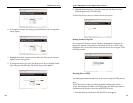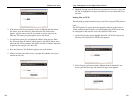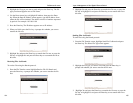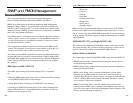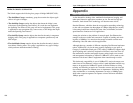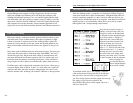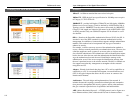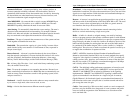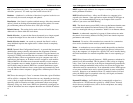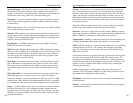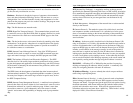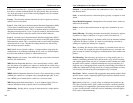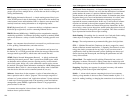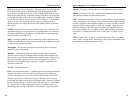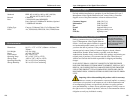
DHCP supports static addresses for computers containing Web servers that
need a permanent IP address.
DMZ (Demilitarized Zone) - Allows one IP address (or computer) to be
exposed to the Internet. Some applications require multiple TCP/IP ports to
be open. It is recommended that you set your computer with a static IP
address if you want to use DMZ Hosting.
DNS - The domain name system (DNS) is the way that Internet domain name
are located and translated into Internet Protocol (IP) addresses. A domain
name is a meaningful and easy-to-remember "handle" for an Internet address.
Domain - A subnetwork comprised of a group of clients and servers under
the control of one security database. Dividing LANs into domains improves
performance and security.
Download - To receive a file transmitted over a network. In a communica-
tions session, download means receive, upload means transmit.
Driver - A workstation or server software module that provides an interface
between a network interface card and the upper-layer protocol software run-
ning in the computer; it is designed for a specific NIC, and is installed during
the initial installation of a network-compatible client or server operating sys-
tem.
DSSS (Direct-Sequence Spread Spectrum) - DSSS generates a redundant bit
pattern for all data transmitted. This bit pattern is called a chip (or chipping
code). Even if one or more bits in the chip are damaged during transmission,
statistical techniques embedded in the receiver can recover the original data
without the need for retransmission. To an unintended receiver, DSSS appears
as low power wideband noise and is rejected (ignored) by most narrowband
receivers. However, to an intended receiver (i.e. another wireless LAN end-
point), the DSSS signal is recognized as the only valid signal, and interfer-
ence is inherently rejected (ignored).
Dynamic IP Address - An IP address that is automatically assigned to a
client station in a TCP/IP network, typically by a DHCP server. Network
devices that serve multiple users, such as servers and printers, are usually
assigned static IP addresses.
117
Layer 2 Management 4-Port Gigabit Ethernet Switch
ProConnect II
®
Series
CPU (Central Processing Unit) - The computing part of the computer. Also
called the "processor," it is made up of the control unit and ALU.
Database - A database is a collection of data that is organized so that its con-
tents can easily be accessed, managed, and updated.
Data Packet - One frame in a packet-switched message. Most data communi-
cations is based on dividing the transmitted message into packets. For exam-
ple, an Ethernet packet can be from 64 to 1518 bytes in length.
Default Gateway - The routing device used to forward all traffic that is not
addressed to a station within the local subnet.
Denial of Service - A protocol that directs the network to no longer respond
to requests that might arise as the result of a Denial of Service attack.
Denial of Service Attack - An assault on a network that floods it with so
many additional requests that regular traffic is either slowed or completely
interrupted.
DHCP (Dynamic Host Configuration Protocol) - A protocol that lets network
administrators manage centrally and automate the assignment of Internet
Protocol (IP) addresses in an organization's network. Using the Internet's set
of protocol (TCP/IP), each machine that can connect to the Internet needs a
unique IP address. When an organization sets up its computer users with a
connection to the Internet, an IP address must be assigned to each machine.
Without DHCP, the IP address must be entered manually at each computer
and, if computers move to another location in another part of the network, a
new IP address must be entered. DHCP lets a network administrator super-
vise and distribute IP addresses from a central point and automatically sends
a new IP address when a computer is plugged into a different place in the net-
work.
DHCP uses the concept of a "lease" or amount of time that a given IP address
will be valid for a computer. The lease time can vary depending on how long
a user is likely to require the Internet connection at a particular location. It's
especially useful in education and other environments where users change
frequently. Using very short leases, DHCP can dynamically reconfigure net-
works in which there are more computers than there are available IP address-
es.
116



